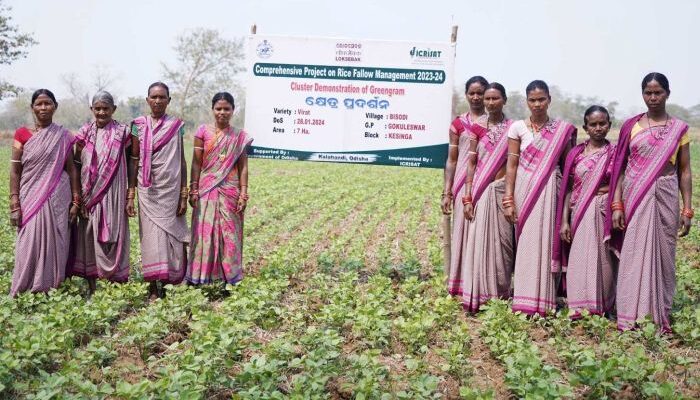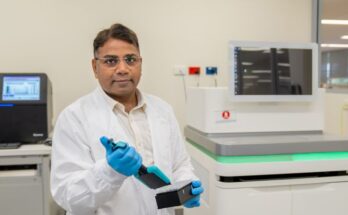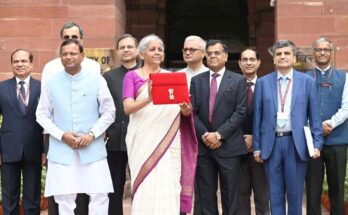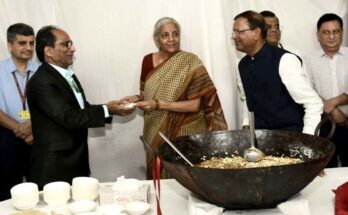Odisha: In the picturesque district of Koraput, home to Odisha’s indigenous people, women stand as both guardians of agricultural heritage and advocates for change. Women from tribal communities are known for their social cohesion, preserving and passing on indigenous knowledge while embracing new solutions – rice fallow cultivation – that align with their values. Reflecting this ethos, the pulse cultivation methods introduced through the ‘Comprehensive Project on Rice Fallow Management’ in 2022-2023 minimised the use of chemical fertilisers and pesticides as much as possible.
Implemented by the International Crops Research Institute for the Semi-Arid Tropics (ICRISAT) in partnership with the Government of Odisha and supported by the local NGO Pragati, the project has made significant strides. Dr. Jacqueline d’Arros Hughes, Director General of ICRISAT, praised the project’s tangible impacts.
“Project reports indicate that 53 per cent of registered farmers are women, who have seen substantial income gains from growing pulses in rice fallows,” said, Dr. Hughes. “Furthermore, the increase in dietary diversity and the rise in daily per capita pulse consumption to 40 grams, meeting the Indian Council of Medical Research (ICMR) guidelines, are noteworthy achievements.”
You may also like to read: Genetic traits of wild species make chickpea improvement possible
The project’s success was driven by the introduction of short-duration pulses—chickpea and black gram—that are ready for harvest in just 90-100 days and thrive in the post-rainy season (rabi) using the residual moisture of the rice fallows.
“The project motivated nearly 62 per cent of participating farmers to cultivate a second crop for the first time in the past five years. The area under rice fallow cultivation doubled, and the productivity of black gram and chickpea increased significantly,” said Dr. Sean Mayes, Global Research Program Director, Accelerated Crop Improvement, ICRISAT.
Engaging the Leaders of Change
Ensuring gender equality in project involvement is crucial for creating an equitable environment. This rice fallow cultivation project meant engaging women as key decision-makers and leaders of change.
“I have witnessed women’s networks fostering a supportive environment for knowledge sharing, skill development, and collective decision-making,” said, Dr. Manzoor Dar, Global Head – Seed Systems, Principal Scientist at ICRISAT.
You may also like to read: TMG enhances genetic improvement efficiency with advanced traceability and phenotyping technology
“The collective mindset of the women in tribal communities made collaboration easier, as they discussed and shared insights from the awareness sessions among themselves. Additionally, women are often more eager and patient than men to try new techniques like line sowing and post-harvest technologies,” added Amrita Pal, Associate Manager, Seed Systems at ICRISAT.
Impact on Diets
The project interventions significantly improved food security and nutritional status, with daily per capita pulse consumption rising from 31.7 grams to 40.2 grams. Additionally, the project results showed a substantial increase in minimum dietary diversity among women (MDD-W) aged 15-49 years, from 29.7 per cent to 43.9 per cent, with pulses being a major contributing factor.
Monetary Gains
Early participants in the project saw a one-third increase in rabi farm income and a one-tenth increase in overall farming income compared to the previous year. Farmers were able to sell a portion of their harvest after meeting household consumption needs.
Upskilling Extension Staff and Farmers
Training sessions for the NGO partner staff and farmers were vital to the project’s success. These sessions covered using a new monitoring and evaluation tool, collecting GIS and soil analysis data, and raising awareness of good agricultural practices.
A Replicable Model
The ‘Comprehensive Project on Rice Fallow Management’ demonstrates a successful gender-inclusive model for intensifying pulse cultivation in rice fallows. With support from the Government of Odisha, the project was scaled up in eight districts, benefiting 152,601 farmers. Despite these successes, the enrolment statistics highlight the need for continued efforts to promote gender inclusivity, offering valuable insights for policymakers advocating for the expansion of this approach.




